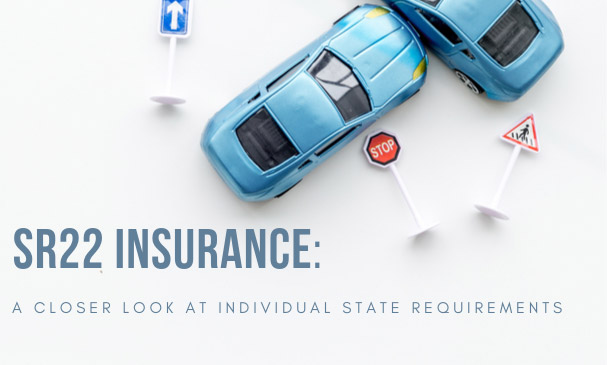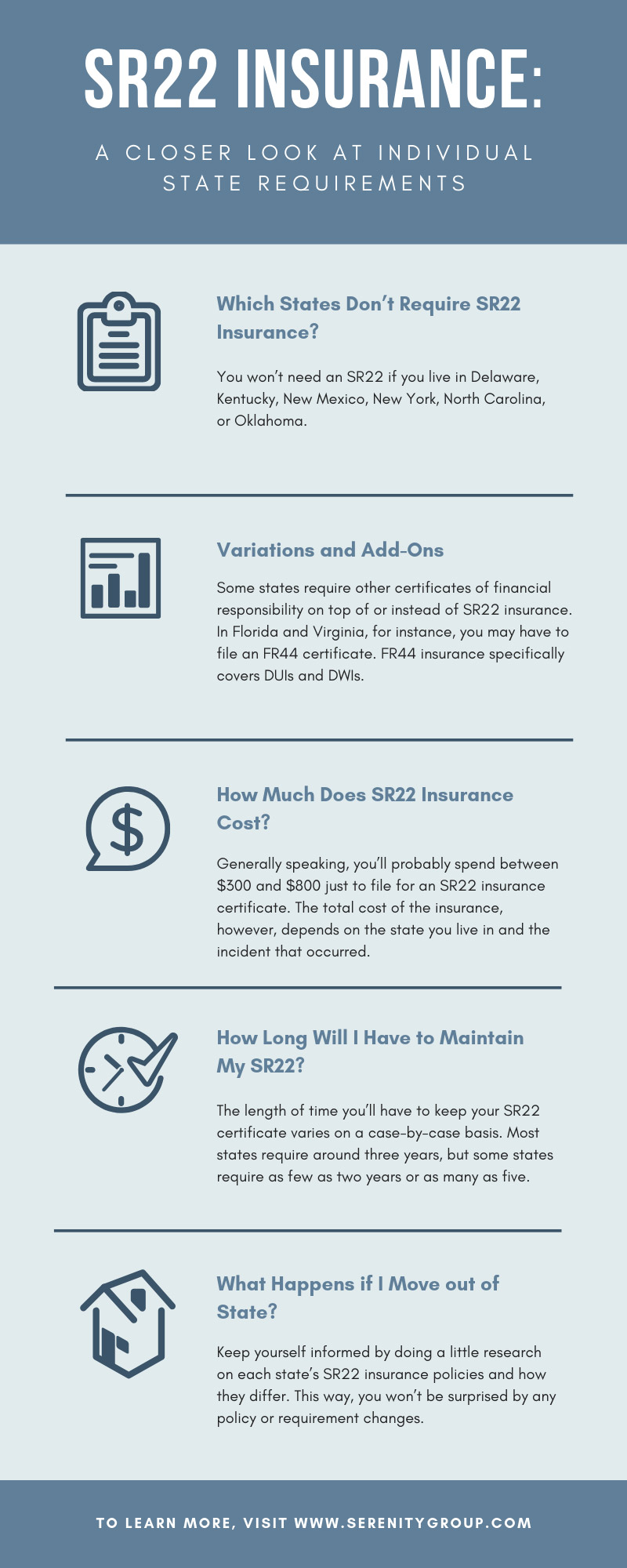SR22 Insurance: A Closer Look at Individual State Requirements

Figuring out SR22 insurance can seem like a daunting task. With so much information to process and so many details that vary state to state, it can be easy to feel overwhelmed by the situation. We’re here to help. With this closer look at individual state requirements for SR22 insurance, you can get the information you need to move forward with the process and with your life.
What is SR22 Insurance?
SR22 insurance isn’t something that makes its way into the average conversation. If you find yourself in need of an SR22, your first step might be figuring out what that means and what you’re supposed to do next. In every state, an SR22 is a certificate of financial responsibility that proves you’re meeting and maintaining your minimum liability requirements after a traffic violation or accident. A court or your state can order an SR22 after you’re convicted of a DUI, driving without insurance, or multiple traffic violations within a period of time. If you don’t keep up with your insurance requirements, your license will be suspended.
Which States Don’t Require SR22 Insurance?
Some states don’t require the filing of any certificate of financial responsibility. You won’t need an SR22 if you live in:
- Delaware
- Kentucky
- New Mexico
- New York
- North Carolina
- Oklahoma
If you’re issued an SR22 in one of these states and later move to a state that does have SR22 requirements, you still won’t be required to have SR22 insurance.
Variations and Add-Ons
Some states require other certificates of financial responsibility on top of or instead of SR22 insurance. In Florida and Virginia, for instance, you may have to file an FR44 certificate. While these states may still SR22 insurance for various types of traffic violations, FR44 insurance specifically covers DUIs and DWIs. Because of the potentially destructive nature of drunk driving, an FR44 requires your insurance plan to have a higher liability minimum. In Virginia, an FR44 doubles the minimum liability requirements, making the coverage limits $50,000 for bodily injury of one person, $100,000 for injury of two or more people, and $40,000 for property damage. In Florida, those coverage limits are $100,000 for injury of one person, $300,000 for injury of two or more people, and $50,000 for property damage.
Arkansas and Indiana also have variations on their SR22 insurance requirements. Arkansas requires an SR21 for you to reinstate your license after an accident with damages exceeding a certain cost. It proves that you had insurance at the time of the accident—as opposed to the SR22 certificate, which proves that you’re maintaining your insurance after the violation. Indiana has a similar policy with its SR50 insurance, which verifies the beginning and ending dates of your insurance policy at the time of the accident or violation. The difference is that the SR50 is specifically for reinstating your license after a DUI.
How Much Does SR22 Insurance Cost?
Generally speaking, you will probably be spending between $300 and $800 on SR22 insurance, but the cost varies depending on the state you live in and the incident that occurred. Each state’s SR22 insurance minimum is based on their liability requirements. These will vary, but most states tend to have coverage requirements of around $25,000 for bodily injury to one person, $50,000 for bodily injury to two or more people, and $15,000 for property damage. While these amounts are the average, however, they can be anywhere from $10,000 to $100,000 depending on the state you live in and the type of violation you committed. That’s why it’s always a good idea to take a look at your insurance company and state requirements.
How Long Will I Have to Maintain My SR22?
The length of time you’ll have to keep your SR22 certificate varies on a case-by-case basis. Most states require around three years, but some states require as few as two years or as many as five. Many states also ask you to file for a new certificate every six months. The length of your SR22 insurance may also depend on the type of conviction you received. Be sure to read up on your state’s guidelines so that you have the right information for your situation.
What Happens if I Move out of State?
If you move to a different state in the middle of your SR22 insurance requirements, things might start to seem a little complicated. This doesn’t have to be an overwhelming situation, however. Keep yourself informed by doing a little research on each state’s SR22 insurance policies and how they differ. This way, you won’t be surprised by any policy or requirement changes. Take a look at your auto insurance provider to see if they serve the state you’re moving to so that you can update your coverage accordingly.
Even if you move to a state that doesn’t require a certificate of financial responsibility, you’ll still need to maintain the SR22 insurance you have in your old state. For example, say you’re issued an SR22 in the state of New Jersey and you move to New York, which doesn’t have SR22 insurance requirements. You’ll need to get auto insurance for New York, but you’ll still need to complete your SR22 requirements for New Jersey. If you don’t keep up with your SR22 insurance, you may face other penalties, such as having your license suspended or even losing your license altogether.
Where to Learn More
Because SR22 insurance requirements vary so much from case to case, it’s always a good idea to learn more about the specific circumstances you’ll face. You can go to your state’s website to find out more about the requirements. Your local DMV will also have information to help you meet the requirements necessary to regain your license and get back on the road. Also be sure to look through your auto insurance provider’s website to learn about their policies and rates.
This may feel like a lot of information to process, but we can help you navigate your SR22 insurance so that you get the right plan for your situation. Once you learn everything you need to know about your SR22 car insurance, you’ll be that much closer to getting back to normal.


Recent Comments